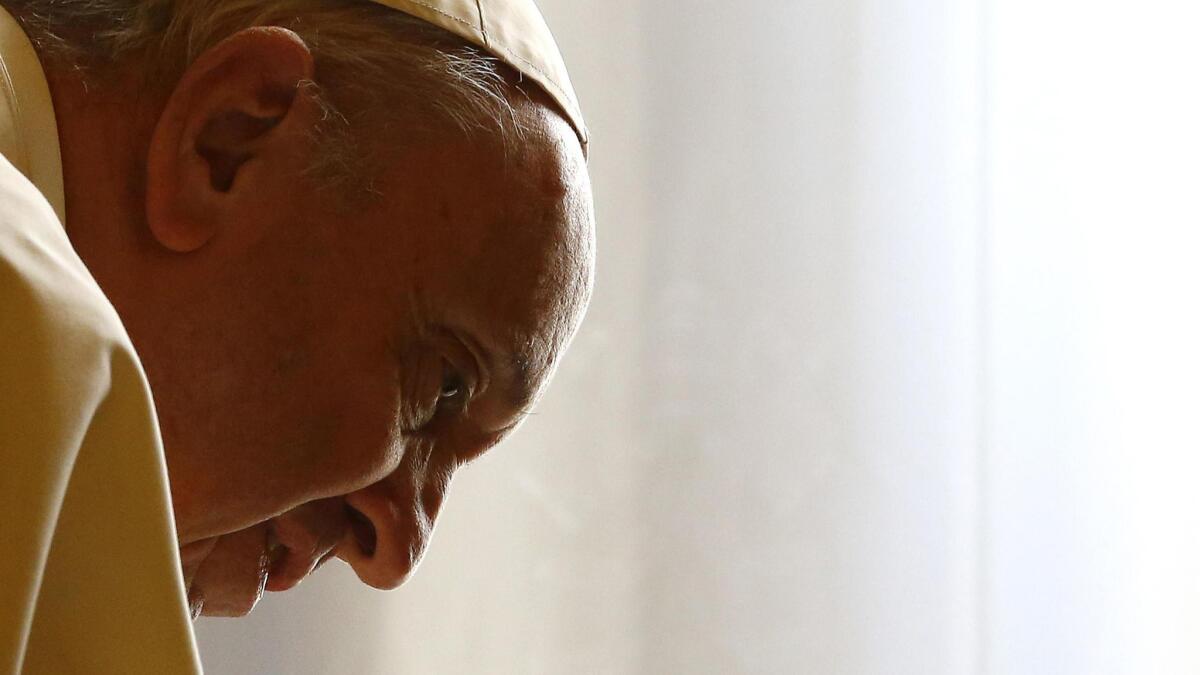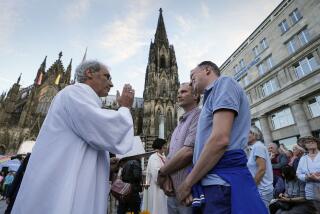Young Catholics give Pope Francis a piece of their collective mind on hot-button issues

- Share via
Reporting from VATICAN CITY — Young Catholics told the Vatican on Saturday they want a more transparent and authentic church, where women play a greater leadership role and where obeying “unreachable” moral standards isn’t the price of admission.
In a fascinating final document from a weeklong Vatican-initiated conference, 300 young people from around the world joined by 15,000 young people online gave the older men who run the 1.2-billion member church a piece of their collective mind.
They urged Pope Francis and the bishops who will gather at the Vatican in the fall to back their recommendations that church leaders must address the unequal roles of women in the church and how technology is used and abused. They warned that “excessive moralism” is driving the faithful away and that out-of-touch church bureaucrats need to accompany their flock with humility and transparency.
“We, the young church, ask that our leaders speak in practical terms about subjects such as homosexuality and gender issues, about which young people are already freely discussing,” they said.
Among the participants, however, there was no consensus on hot-button issues such as church teaching on contraception, homosexuality, abortion or cohabitation. The document said some young people want the church to change its teaching or better explain it; others accept the teachings and want the church to proclaim them more forcefully.
But overall, the young people concluded, the church often comes off as too severe and its “excessive moralism” often sends the faithful looking elsewhere for peace and spiritual fulfillment.
“We need a church that is welcoming and merciful, which appreciates its roots and patrimony and which loves everyone, even those who are not following the perceived standards,” they said.
The 300 young people who attended the conference were mostly selected by their national bishops’ conferences, universities or church movements. A handful of non-Catholics and non-Christians, as well as some atheists, also participated, and those views were incorporated into the final document.
Their reflections will be formally presented to Francis on Sunday — Palm Sunday — and will become one of the working documents that will guide discussions during an October synod of bishops at the Vatican on better helping young people find their way in the church.
Four times in the 16-page document, the participants demanded greater and equal roles for women in the church, calling for “real discussion and open-mindedness” about ways to promote the dignity of women so they feel accepted and appreciated.
“Some young women feel that there is a lack of leading female role models within the church, and they too wish to give their intellectual and professional gifts to the church,” they said.
The young people also made it clear that they love their technology and the church must get hip to that or lose relevance. At the same time, the document said young people are looking for guidance as to how to responsibly use technology and combat online addiction, pornography and cyberbullying.
They called for the Vatican to issue a teaching document about technology, and use it better to spread the faith.
The final report is brutally honest in places, responding to Francis’ call on the first day for the participants to speak freely and courageously.
It noted that young people are leaving the church in droves, in part because they have experienced “indifference, judgment and rejection” by the institution.
Church leaders, they say, are too focused on administration than community, and use words like “vocation” and “discernment” that young people often don’t understand.
But mostly, they say, the church needs to admit that it is human and makes mistakes, and that its mentors aren’t perfect people but forgiven sinners. The document cited the clergy sex abuse scandal as both an error that has driven people away and an ongoing issue that requires admission of wrongdoing.
“Some mentors are put on a pedestal, and when they fall, the devastation may impact young people’s abilities to continue to engage with the church,” they said.
More to Read
Sign up for Essential California
The most important California stories and recommendations in your inbox every morning.
You may occasionally receive promotional content from the Los Angeles Times.










